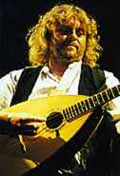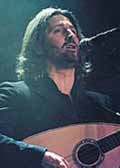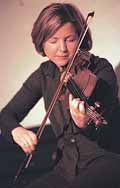 |
||
HOME | NEWS | REVIEWS | ARTICLES | PEOPLE | LIVE MUSIC | LATEST ISSUE | SHOP | SUBSCRIBE | NEWSLETTER |
The Living Tradition
|
|
|||
| Brian Peters & Gordon
Tyrrall |
|
|||
|
{graphic} |
||||
|
The dynamic duo discuss evolution with
Alan Rose I recall the early
seventies around the West Yorkshire folk scene with more clarity than
I deserve, and well remember back then how any music connected to the
name "Gordon Tyrrall" would be well worth hearing. He always seemed fresh from some mighty Leeds
session, either with tunes bursting from his flute or yet another totally
original guitar and voice treatment of something significant and traditional.
It was only when he started to make records that we received the
full impact of his virtuosity – his self-deprecating style when playing
live meant that audiences refused to believe their ears!
As a member of first Iona and then Dab Hand he recorded and toured
with top-notch Anglo-Celtic musicians, while his solo work developed along
the seemingly contradictory paths of serious study and red-hot playing.
The years roll by, the albums keep coming and he always seems to
find new areas to explore, from peasant poets to Buddhist conundrums. My acquaintance with Brian Peters' music
is neither so long-standing nor so recurrent.
However, I was given the opportunity to play, review and enjoy
his "Sharper Than The Thorn" CD in 1996, and shortly afterwards
to see the stage production, "The Widow's Uniform". Despite its obvious flaws, this was a gallant
(and dramatic) attempt to bring the wonders of Peter Bellamy's Kipling
settings to a wider audience and I was greatly impressed by the show in
general and by Brian in particular. Like
Gordon he has multiple strings to his bow, making a name on the one hand
as a squeezebox expert on both melodeon and anglo-concertina, and on the
other as a singer and guitarist unafraid to take on some of the biggest
ballads around. He also revealed a sympathy for American traditional
music in his work over several years with Sara Grey. Could they recall how it was they first took
that big decision to go full-time? Gordon
remembers it well: "I was in the van, setting out on tour with Iona,
and Margaret Thatcher's election win was on the news, so I can date it
with some certainty to 1979. Going
professional was just a matter of being in a band and deciding to try
it full-time." Thatcher had
a part in Brian's decision too: "I
was working full-time as a research scientist until 1987, but her government
had cut the funding so much that it was a constant struggle to get contracts
renewed, and finally I found myself out of a job. I was already playing folk clubs on a semi-pro basis so I just took
it from there." What had
attracted him to the squeezebox, I wondered?
"The first folk festival I ever went to - Whitby in 1977 -
I saw the late Mel Dean (once of Old Swan Band) stand up in a room and
play some tunes on the Anglo, and I just thought it was so cool I had
to get one myself." The pair kept running into one another at
various festivals and, having heard Gordon's then duo with Dave Townsend,
and been impressed by the combination of guitar and concertina, Brian
asked Gordon to play on a few tracks of the "Seeds of Time"
album in 1991. Live dates followed, and they quickly found
that as well as a shared musical compatibility they had a common philosophy
- a philosophy obvious to anyone with ears who has heard either "Clear
the Road", their 1996 debut album, or "The Moving Moon",
their current offering. Despite
promises of Beatles, Stones and Dylan (who, to be fair, do get a look
in), most of their material is drawn from the British tradition.
And in both their solo work and duo material, they have always
looked for the less-common variants of songs, so that well-known titles
like 'The Mermaid' or even 'The Wild Rover' come out sounding like you've
never heard them before. How do
they go about finding their material?
"I've actually recorded three different versions of 'The Mermaid'
in my time," mentions Gordon. "Quite
a lot of the stuff comes from books, but I'm also listening to a lot of
recordings of traditional singers like Harry Cox or Joseph Taylor, and
learning songs from them. In a
way a song feels more alive when you've heard someone actually sing it,
rather than just seen it in the pages of a book.
Sometimes you think, well maybe no-one ever sang this because it
isn't really that good!" Brian has a similar approach: "I'm working
on a new solo album at the moment, and several things on that come from
recordings of source singers. Sometimes
you hear Harry Cox or Walter Pardon's version of such-and-such a song
and it sounds so complete that you don't really want to mess with it. Other times I'm working with very raw material
from the Child Ballads, cutting and pasting from several different versions,
adding bits of my own and maybe rewriting a tune or lifting one from somewhere
else. Which way I choose to approach
a song is on a whim, really. I
think both of us follow the model of the 70s revivalists - Carthy, Nic
Jones, Pete and Chris Coe - who were very much into creating their own
distinct repertoire. When I set
out I thought it was unpardonably naff to just lift songs off the records
of those kind of people; and now there are so many recordings of traditional
singers available on CD, there's no shortage of raw material." "It's all about making your own interpretation," insists
Gordon, "not just in finding a different version of something, but
in the way you treat it each time you perform it. I try to bring out the emotional content of the song - that's what
music is about for me, a means to the expression of emotion." Gordon has developed as a songwriter, too.
"Yes," he remembers, "I think one or two people
close to me were a bit surprised when I started coming out with my own
songs on, let's say, social issues. It wasn't what they were expecting...." To start with, the repertoire consisted mainly
of one playing and singing his arrangement of a song or tune he'd discovered,
while the other "tried not to get in the way too much!"
However, this has evolved into a more genuinely two-pronged approach
to arrangement: "Things are emerging jointly now," Brian explains,
"so on 'High Barbary' we start off with me singing against Gordon's
guitar, and the box doesn't come in until later; or on 'Crockery Ware',
Gordon sings to my concertina accompaniment. We were on tour last week and messing around
with some new tunes in between gigs, and I felt they were starting to
come together almost instinctively, after playing together for quite a
few years." Gordon believes
in the evolutionary theory of repertoire, maintaining that there are definite
Darwinian elements at work as some songs or tunes dwindle from the set
list whilst other fitter specimens prosper and grow. "Sometimes nothing actually gets said, you just find that a
certain song has got quietly dropped!" Both Tyrrall and Peters have now been professional
musicians for many years, and during that time have seen significant changes
in the club and festival scene. "To a certain extent," says Gordon, "folk music is
emerging into the mainstream with Arts Centre gigs and airings on Radio
Three, but the folk clubs are in continuing decline.
I still really like folk clubs, and I think they're a unique performing
environment which it would be a great pity to lose. I notice people on
the internet chat groups are actually starting to defend them now, after
years when everyone has done nothing but knock them." Brian's with him on this: "You can perform things in a folk
club which make demands on your audience, that you can't always do in
other types of venue. It's a mixture
of the intimate environment and an emphasis on people actually listening." Brian and Gordon are both finding an increasing
amount of work as teachers; residential weekends like those organised
by Hands On Music at Witney - where Gordon has led workshops on both flute
and guitar, and Brian has taught melodeon and concertina - are becoming
ever more popular, and both of them take individual pupils too. "Shops are opening up everywhere for 'folk'
instruments," says Brian, "and there's a demand there both from
younger people discovering acoustic music for the first time, and from
older ones who've got a bit of money to spend.
Box players all seem to want a £2000 Castagnari these days!" Maybe that's part of the reason for the decline
in the clubs: if someone has spent a fair amount of time and money learning
to play, say, the concertina, the last thing they want to do is to go
to a folk club to listen to the whole variety of what goes on there -
they want to go to a session where they can play all night! Who wouldn't? "Well
I wouldn't," Brian declares, "I think you need to listen to
other people, not just play all the time." Which is where the festivals gain over the
clubs - our box-player plays in a session all night, goes to Brian's workshop
next morning to find out what they should've been doing, then goes to
see Gordon and Brian in concert in the afternoon to find out how far they
still have to go - the best of all possible worlds.
We are talking about evolution again.
The folk scene is going to change, the popular bits will grow and
the unpopular bits will drop off - it's the way it's always been, and
both Gordon and Brian are refreshingly pragmatic.
As well as their solo careers and the duo, they have a number of
other projects on the go - both play in ceilidh bands (Magnetic North
and Rising Sun Band respectively), Gordon is proud to be one of Maggie
Boyle's guitarists, and Brian is a kingpin of The Rocky Mountain Ploughboys
who bravely bring the melodeon to anything from Old-Time American music
to Chuck Berry! As for the pipeline, there is talk of a tour
revisiting Gordon's album 'A Distance From the Town' which so satisfyingly
set many of the poems of Northamptonshire poet John Clare alongside the
dance tunes Clare collected. "Brian
and I still perform a few things off that album, like 'The Quiet Mind’
and some of the instrumentals, and I'm looking to put together a small
band, maybe with some of the others who played on the CD, and go out and
do a live show." Which is
definitely something to look out for. But the duo remains an important part of
the picture. I've always thought
that the duo format is in some ways ideal, giving a bigger sound than
a soloist can hope for, but allowing a flexibility that starts to disappear
when you add more musicians. Tyrrall
and Peters like to think of themselves as a mini-band.
Having two guitars, flute from Gordon and a range of free reeds
means they have the instrumental side of things well covered, and for
evidence of vocal expertise and commitment, as well as an increasing use
of harmonies, I have only to refer readers back to the aforementioned
CDs. But that's only if you don't have a chance
to see them live. Alan Rose
|
||||
|
Links, further information and recordings: |
NEWS | REVIEWS | ARTICLES | PEOPLE | LIVE MUSIC | LATEST ISSUE | SHOP | SUBSCRIBE | NEWSLETTER The Living Tradition Ltd - Registered in Scotland - Company No. SC 150633 |



